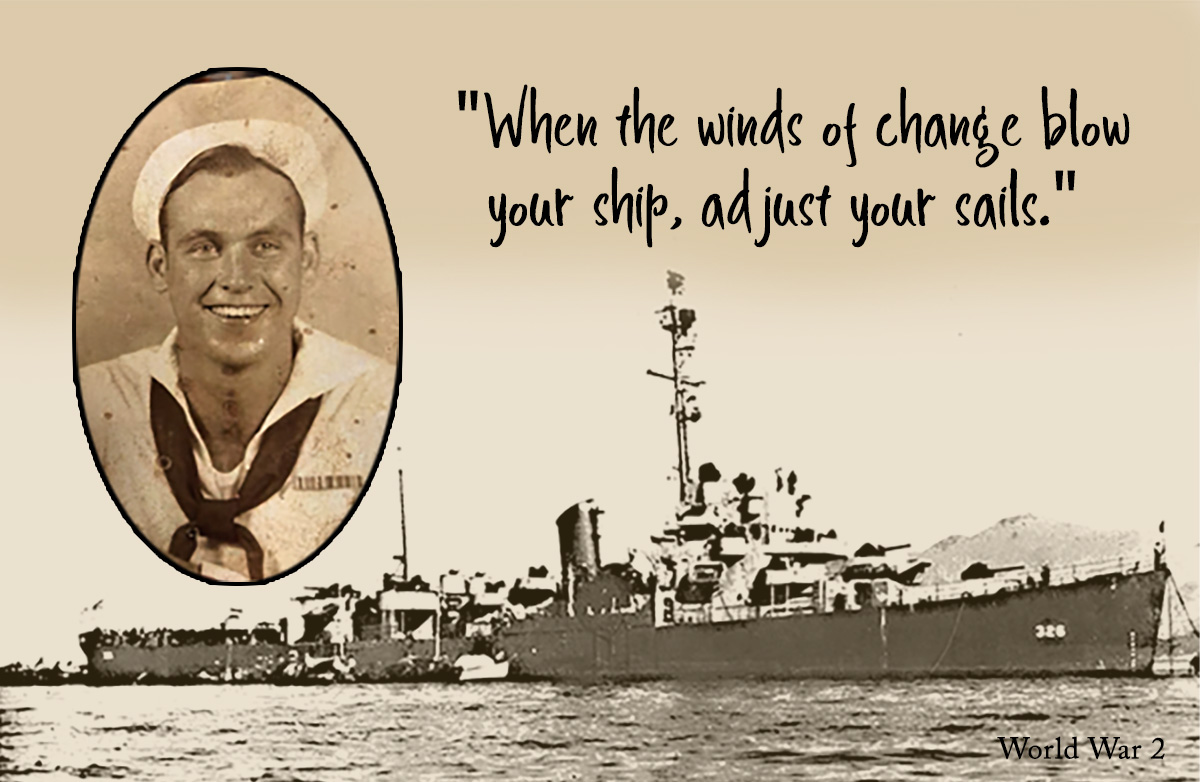
“When the winds of change blow your ship, adjust your sails.”
My father served in World War II as a sailor aboard a destroyer escort, the USS Thomas J. Gary. Following is his story told based on conversations with my mother, supported by historical documents, photos, and stories from shipmates and sailors on other ships taking part in the rescue of POWs in 1945. ~ Sandi
As a young girl, I often played with my dolls in the large walk-in closet of my parents’ bedroom. The space became an enchanting world for a six-year-old as I played dress-up with my mother’s handmade dresses of cotton and crocheted lace. I especially liked her black velvet hat adorned with ribbons and pearls. Mama only wore it for Sunday morning church or funerals. Mama’s green eyes twinkled like bright emeralds behind the hat’s netted veil that barely touched the tip of her nose. When I played dress-up with her hat, the netting fell past my chin. I didn’t care that it was too big; it made me feel elegant. Occasionally, Mama let me wear her black patent high-heeled shoes. I was careful not to scratch them.
One day, while standing on a chair to reach for Mama’s special hat, I noticed a box in the back corner of the closet shelf. Curiosity got the best of me, and I tugged the lid open to peek inside. I saw pictures of men, some on stretchers and others sitting on a bench with blankets draped across their shoulders. Bandages covered their foreheads, and some had bandages across their chest. The sunken and lifeless eyes of the men in the photos peered back at me. They were the skinniest people I had ever seen; they had no fat on their bones.
I took the box and ran to where my daddy sat in his favorite chair, reading the daily newspaper. I placed the box in his lap.
“Daddy, these men look sad. Are they sick?”
The newspaper hid his face from my view, but I heard a slight groan come from deep within his chest. He took a deep breath, folded the newspaper, and stood. Without an explanation, he walked to the bedroom closet and placed the box back on the shelf.
Time and again, I took the box out of the closet and asked, “Daddy, who are these sad men?” Each time, a painful and haunting expression crossed his face.
When I was twelve, he said, “Maybe one day we will talk about it.” As always, he placed the box back on the shelf.
In my late teens, my dad suffered a fatal heart attack. A few months after his death, my mother built a home next to my grandparents. While packing for the move, I took the box off the shelf and asked Mama to tell me about the photos. And she did.
Finally, I understood the box held more than pictures. The contents represented my dad’s personal, heart-wrenching experience during a frightening, horrible war—World War II, and the rescue of POWs.
This is my daddy’s story.
• • • 1944
James sat on the deck of the USS Thomas J. Gary and watched the moon rise high into the sky. The ocean sat calm underneath the glow of the moonlit night. A dolphin emerged out of the water, making an enormous splash as it returned to the depths of the sea. James determined that no matter what lay ahead, he would always remember this peaceful moment—a flicker of hope in a world gone mad.
Raised on a farm, he never traveled more than a few miles from home until he joined the Navy in 1943 at age seventeen. Like many of his shipmates, he was homesick, exhausted from a lack of sleep, and lived in a constant state of readiness for battle as World War II raged on.
He pulled a letter from his shirt pocket. He had read the heavily creased and stained letter many times since he received it two months ago. It was the closest thing to being at home. He laughed at the part his brother wrote about Sue, the family milk cow.
Sue showed up for church, putting her head through the open window right behind Uncle Henry, who was sitting sound asleep on the back pew. The loud moo startled Uncle Henry, who immediately stood and shouted, Amen! Preacher Ellis was in the middle of the invitation. He blames Uncle Henry for all the lost souls who would have walked forward to accept Jesus if Uncle Henry’s outburst had not distracted them as the entire congregation erupted into uncontrollable laughter. Since then, Aunt Eunice nudges Uncle Henry at the slightest sign that he is falling asleep in church.
James frowned as he looked at his watch. Only three more hours before his crew would be on duty. Folding the letter securely in his pocket, he stood, took a deep breath, and exhaled. Enough of this homesickness.
He emptied the last few drops of his coffee into the swirling Atlantic, then turned and made his way down the ladder to the ship’s berth. Quietly, he folded his pants and shirt and placed them neatly in his footlocker. Shivering, he crawled into his bunk and pulled the scratchy, woolen blanket snug under his chin for warmth.
Clack. Thump. Clack. Thump. The sound from the engine room below reminded him of the old well back home as the pump moved up and down, drawing water from deep in the ground. As the ship pitched back and forth in the water, it calmed his tired body, and soon he drifted into a deep sleep.
• • •
“Stop the truck, Bill.” The 1932 Ford rambled to a halt. James opened the door and stood on the side of the dirt road as he breathed in the fresh air of his rural Mississippi countryside. He stepped across the ditch and leaned against the old split-rail fence as a curious herd of white-faced cows moved close to inspect their visitor.
In the distance, a cloud of dust rose as the plow of a Fordson tractor dug deep into the hard ground, turning the Mississippi red dirt into rows for summer crops.
Beyond the plowed field, the tin roof of his childhood home glistened in the sun. Built by his grandfather, the house had withstood time, tornadoes, and three generations of his family.
Mama was in the kitchen, sweating over a hot stove as she prepared crispy fried chicken, mashed potatoes with gravy, and a big bowl of purple hull peas. The smell of a home-cooked meal permeated his mind as his mama set a large pan of buttermilk biscuits, slathered with fresh cream butter, on the table.
His father and brothers waited on the porch, eager to see him return home from war.
At the sound of a horn blowing, James turned and glared at his cousin. Bill has no patience at all. The ground beneath his feet seemed to shake as Bill started the truck and revved the engine. “Come on, James, we gotta’ move! Hurry it up!”
James reached to open the truck’s door, but instead, his head hit the hard steel frame of the bunk above him, waking him from his dream. The sound of warning sirens aboard the USS Thomas J. Gary brought him fully awake.
• • •
James rubbed his head as he rolled out of his bunk. The reality of war aboard a ship out in the Atlantic invaded his dream of home and family.
In a matter of seconds, James and the other crew members rushed to their battle stations. The crew detected a U-boat, the Germans’ most feared naval weapon, within reach of the convoy.
By late 1943, the U-boats had sunk over 1,000 allied ships since the war began. The tide turned when the U.S. Navy placed destroyer escorts in service to provide a safety net for convoys crossing the Atlantic. The escorts’ capability to seek and destroy the U-boats earned them the name “Shepherds of the Sea.”
• • •
On May 7, 1945, as news came of the unconditional surrender of Germany, the USS Thomas J. Gary completed its Atlantic convoys and headed to the Pacific.
In early August, Allied forces dropped atomic bombs on Japan. On September 2, 1945, peace agreements signed aboard the USS Missouri ended World War II.
Allied POWs were dying daily from diseases, starvation, and brutal treatment. The safety concern for the prisoners heightened when Japan surrendered.
On the island of Formosa, the Japanese military’s treatment of POWs was brutal and deadly. Without delay, a task group, initially intended for a mine-clearing mission, diverted to the island on a rescue mission. They steamed through waters laced with minefields, faced a full-blown typhoon, and arrived on the Formosa coastline on September 4.
Early on September 5, the USS Thomas J. Gary and a sister ship cautiously entered the harbor. Tensions were high during the eight hours it took to reach the short distance to the dock. Traveling through a heavily infested naval minefield, the crew stayed calm, focused, and moved ahead to reach their destination.
Without clear communication, the crew did not know what to expect from the Japanese military on the island. Tensions slightly improved when they reached the dock, and dialogue began. They agreed on arrangements for the landing party to evaluate the food and medical needs in the POW camps.
On September 6, evacuation began. With POWs loaded safely on the destroyer escorts, they maneuvered through the waters again but took a different route to avoid the minefields. After several trips, transferring 1,160 POWs to the waiting carriers was complete. A small team of medical personnel stayed behind with those too sick to transport until they were well enough to travel.
• • •
In 1946, my father safely returned home, but the memories of war, especially of the POW rescue, remained with him throughout his life. Like many who served, they went in as boys but came out as men and carried with them memories that would haunt them for the rest of their lives. My dad brought home photos that tell a story he never could. Because of the photos kept in a box on a shelf, my dad’s story, and the story of many young men, lives on today.
I am proud my dad was part of the “Shepherds of the Sea.” And I am also thankful that he was the “shepherd of my seas of life,” especially during stormy times.
It is my hope you have great memories of your father. But just by chance you do not, let me point you to a faithful Father who is the “great Shepherd,” and He will always be your guide when the winds of change come into your life.
The one who enters by the gate is the shepherd of the sheep. 3 The gatekeeper opens the gate for him, and the sheep listen to his voice. He calls his own sheep by name and leads them out. 4 When he has brought out all his own, he goes on ahead of them, and his sheep follow him because they know his voice. John 10:2-4 (NIV)
Discover more from Sandi Herron - Life at Spring Meadows
Subscribe to get the latest posts sent to your email.
